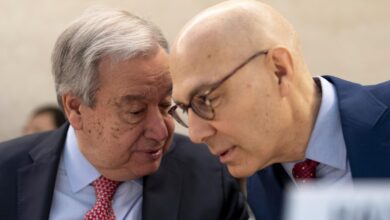Critical minerals are big part of Donald Trump’s fixation

An aircraft alledgedly carrying US businessman Donald Trump Jr. arrives in Nuuk, Greenland on January 7, 2025.
Emil Stach | Afp | Getty Images
U.S. President-elect Donald Trump’s pursuit to acquire Greenland could well be motivated by critical minerals, with mining executives and researchers describing the island’s massive resource potential as an “enormous opportunity.”
Trump’s years-long bid to take control of the world’s largest island has kicked into overdrive in recent weeks.
Ahead of his inauguration on Jan. 20, Trump said U.S. ownership of the autonomous Danish territory is an “absolute necessity” for purposes related to “national security and freedom throughout the world.”
Trump has since doubled down on those comments, refusing to rule out the use of military or economic force to make Greenland a part of the U.S.
Greenland’s Prime Minister Mute Egede has told Trump that the Arctic island is “not for sale” and urged the international community to respect the territory’s aspirations for independence. Alongside Danish Prime Minister Mette Frederiksen, Egede has also recently called for talks with Trump to resolve the situation.
Asked about Trump’s fixation on making Greenland a part of the U.S., the president-elect’s incoming national security advisor, Rep. Michael Waltz, R-Fla., was unequivocal.
“This is about critical minerals. This is about natural resources,” Waltz told Fox News in an interview on Jan. 9.
“This is about reintroducing America in the Western Hemisphere,” Waltz said. “You can call it Monroe Doctrine 2.0, but this is all part of the ‘America First’ agenda.”
Greenland is going to become more and more topical; it is going to become more and more front and center because of the climate change discussion, the critical metals discussion and the geopolitical discussion.
Roderick McIllree
Executive director of 80 Mile
Critical minerals refer to a subset of materials considered essential to the energy transition. These minerals, which tend to have a high risk of supply chain disruption, include metals such as copper, lithium, nickel, cobalt and rare earth elements.
Critical minerals and rare earth elements are vital components in emerging green technologies, such as wind turbines and electric vehicles, energy storage technologies and national security applications.
China is the undisputed leader of the critical minerals supply chain, accounting for roughly 60% of the world’s production of rare earth minerals and materials. U.S. officials have previously warned that this poses a strategic challenge amid the pivot to low-carbon energy sources.
In this aerial view melting icebergs crowd the Ilulissat Icefjord on July 16, 2024 near Ilulissat, Greenland.
Sean Gallup | Getty Images News | Getty Images
Jakob Kløve Keiding, senior consultant at the Geological Survey of Denmark and Greenland (GEUS), said a 2023 survey of Greenland’s resource potential evaluated a total of 38 raw materials on the island, the vast majority of which have a relatively high or moderate potential.
These materials include the rare earth metals graphite, niobium, platinum group metals, molybdenum, tantalum and titanium.
“Overall, we can say that there is a huge potential for critical raw materials [in Greenland],” Keiding told CNBC via telephone.
“Many of these are of great importance for the EU economy and, of course, it is not limited to just Europe. Many of these are also on the list of American [critical raw materials],” he added.
‘Greenland is not for sale’
Aaja Chemnitz, a Greenland member of the Danish parliament from the Inuit Ataqatigiit party, described Trump’s comments about Greenland as “disrespectful” and reaffirmed the prime minister’s message by saying the territory is not for sale.
“I’m not concerned. I think that some people in Greenland are quite concerned, but I think it is important for us to say that Greenland is not for sale, never has been for sale [and] never will be for sale,” Chemnitz told CNBC’s Silvia Amaro on Monday.
Chemnitz said Greenlandic lawmakers would need to have “clear and very specific goals on how to collaborate with the U.S.”
Closer ties between Greenland and the U.S. moving forward, for instance, could help to facilitate investment in the island’s mining industry, she added.
“If we look at extraction, for example, of rare earths. This is something that we have been willing to do for a very long time. We’ve been looking for American investors, [but] we haven’t found them, so they are quite welcome,” Chemnitz said.
The U.S. military maintains a permanent presence in northwest Greenland at the Pituffik Space Base, formerly known as Thule Air Base.
‘A race for what’s left’
Roderick McIllree, executive director of U.K.-based mining company 80 Mile, said he’s been working in Greenland for just over 20 years on projects ranging from resource discovery to feasibility.
“I think that what we’re seeing in Greenland is really a race for what’s left,” McIllree told CNBC via video call.
“A lot of independent state surveys are pointing to Greenland and its natural shelf boundaries as potentially hosting 20% to 25% of the last remaining extractable resources on the planet. Now, if that’s right, that’s an enormous opportunity for Greenland.”
The Old Colonial Harbour of Nuuk, Greenland is pictured on August 30, 2024. Greenland, an icy land whose rugged landscapes are bewitching, wants to attract more tourists, a paradox for a territory that is particularly vulnerable to global warming and whose geographical isolation means that many people have to take planes to get there.
James Brooks | Afp | Getty Images
80 Mile currently has three projects it is actively developing in Greenland, including a large oil concession on the island’s east coast, a titanium project near Pituffik in the northwest and its Disko-Nuussuaq project in the southwest.
Underlining the resource potential in the territory, McIllree said the firm’s Disko project could be one of the largest occurrences of nickel and copper on the planet.
“Greenland is going to become more and more topical; it is going to become more and more front and center because of the climate change discussion, the critical metals discussion and the geopolitical discussion. And its proximity to the U.S. really kind of makes it a natural jurisdiction for significant U.S. investment,” McIllree said.
“If Greenland play their cards right, this will lead to their independence,” he added.
‘Significant strategic interest’
In March last year, European Commission President Ursula von der Leyen traveled to Nuuk, Greenland to inaugurate an EU office in the island’s capital.
The move, which came several months before Donald Trump Jnr.’s recent trip to the same city, was designed to firm up Europe’s presence in the territory as well as the broader Arctic region.
Von der Leyen announced two cooperation agreements totaling almost 94 million euros ($95.9 million) at the time, which she said would be used to invest in clean energy, critical raw materials and skills in Greenland.
(L-R) President of the European Commission Ursula von der Leyen, Greenlandic Prime Minister Mute B Egede and Danish Prime Minister Mette Frederiksen sign an agreement on the opening of the European Commission’s new office in Nuuk, Greenland, on March 15, 2024.
Leiff Josefsen | Afp | Getty Images
“I’m a geologist by background and I know that Greenland is very well endowed with natural resources,” Paul Lusty, head of battery raw materials research at Fastmarkets, told CNBC via video call.
“There has been a lot of interest in rare earths in Greenland, for example, and clearly, they can be of significant strategic interest to the U.S.,” Lusty said.






